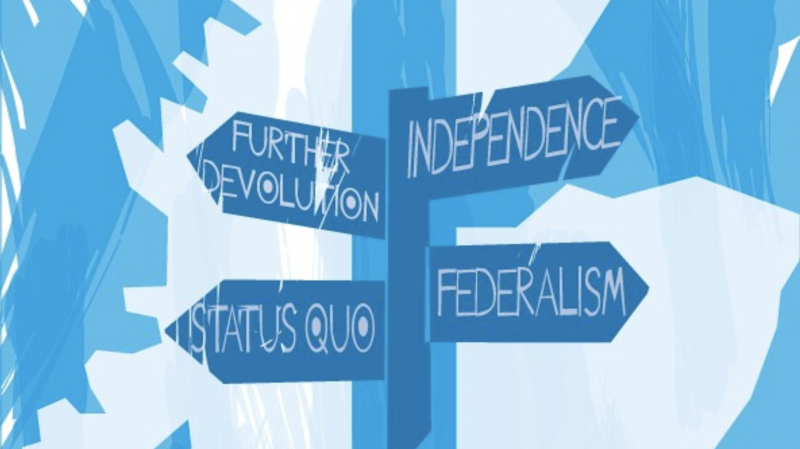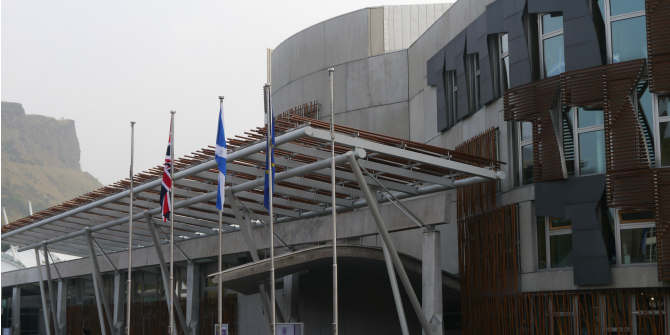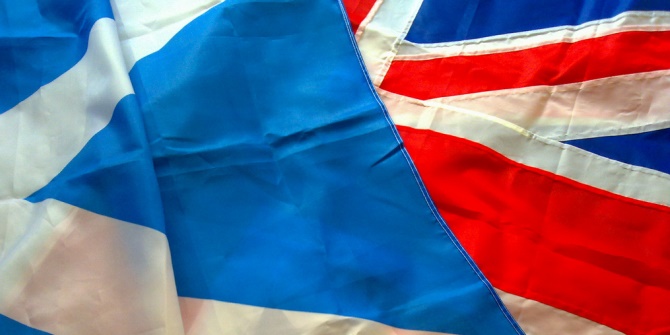
 Last month, the debate about an independent Scotland’s relationship with the EU spluttered back to life when a group of financiers observed that staying in the UK posed the biggest threat to Scottish EU membership. Given the EU’s growing intrusion into the everyday lives of European citizens and the importance of unimpeded access to the Single Market to the economic prospects of a newly independent Scotland, the fixation with prospective Scottish membership is understandable. Nevertheless, the almost exclusive focus on the EU has deflected attention from Scotland’s potential relationship with other international organisations and the problems membership of these organisations might pose both to Scotland and the remainder of the UK (RUK), write Richard Woodward and Michael Davies.
Last month, the debate about an independent Scotland’s relationship with the EU spluttered back to life when a group of financiers observed that staying in the UK posed the biggest threat to Scottish EU membership. Given the EU’s growing intrusion into the everyday lives of European citizens and the importance of unimpeded access to the Single Market to the economic prospects of a newly independent Scotland, the fixation with prospective Scottish membership is understandable. Nevertheless, the almost exclusive focus on the EU has deflected attention from Scotland’s potential relationship with other international organisations and the problems membership of these organisations might pose both to Scotland and the remainder of the UK (RUK), write Richard Woodward and Michael Davies.
The Scottish independence manifesto recognises that international organisations contribute significantly to the rules-based international system upon which Scotland’s prosperity and security will depend. To this end, the manifesto envisages an independent Scotland playing ‘a full role in the international organisations that set the standards for trade, finance, health, labour relations and other key issues and support an international legal system’ and contains commitments to pursue membership in, inter alia, the EU, United Nations (UN), the North Atlantic Treaty Organization, the Council of Europe (COE), the Organization for Security and Cooperation in Europe, the Organization for Economic Co-operation and Development (OECD), the World Trade Organization (WTO) and the Commonwealth.
Scotland’s accession to some international organisations is likely to be straightforward. For many, such as the UN Specialized Agencies or COE, Scottish membership will be quasi-automatic only needing ratification by a governing body at the appropriate time. For other organisations, however, the process is likely to be protracted and potentially problematic. Recent accessions to the OECD took four years to complete as the organisation sought to ensure new members met its exacting standards. Likewise, some organisations (e.g. WTO) require membership negotiations to be approved by consensus raising the spectre of delays similar to those anticipated in the EU. Even short delays in accession may prevent Scotland from defending its interests in key areas.
As with the EU debate, the manifesto seems blithely to assume that Scotland will automatically become a member of international organisations by virtue of the UK’s membership and therefore the usual rules pertaining to accession do not apply. In this regard the manifesto appears to want its cake and to eat it: while recognising the importance of a rules-based international order, it also appears to believe international institutions should relax or suspend rules governing membership to facilitate Scotland’s accession.
By focussing on accession, the debate on Scotland’s relationship with international organisations has also ignored the issues the country will face after membership has been granted. The Scottish manifesto rightly notes that many comparable states play significant roles in international organisations. Indeed clever use of international organisations enables small states to achieve disproportionate influence. However, there are potentially serious downsides to the smaller and less costly diplomatic apparatus being proposed and some of the assertions about cost savings are questionable.
Although Scotland may be able to field permanent delegations, their relatively small size will limit their range of capabilities and their proficiency for steering debates, especially in international organisations covering a wider range of issues or those that put a premium on technical expertise. For instance, Scotland’s effective participation in the global economy and international communications will necessitate membership of, and experts to contribute to, bodies including the International Telecommunication Union, the Universal Postal Union and the International Civil Aviation Organization.
The everyday participation in international organisations is often undertaken by representatives from national capitals. The cost of attending international meetings/councils and technical committees and indeed other direct costs of membership in these organisations is currently “hidden” in UK departmental budgets and does not appear to have been fully factored into the Scottish assessment. Thus, for example, the UK contribution towards the International Bureau of Weights and Measures (BIPM) is paid through the UK National Physical Laboratory (NPL) and attendance at various BIPM committees is the responsibility of senior NPL staff. Scotland may be given some financial compensation for its share of the NPL’s assets but there is only one laboratory and it will be in RUK.
Some of the domestic consequences of international organisations membership also appear to have been overlooked. For example, membership of the World Intellectual Property Organization and the European Patent Organization would be essential for Scotland to protect its intellectual property but genuinely effective membership will necessitate Scotland building a national patent office from scratch. Likewise, a key plank of the independence platform is that it will allow Scotland to pursue a significantly different political economy from that prevailing in RUK. However, a future Scottish government’s room for manoeuvre is likely to be cramped by the liberal mindset prevailing at international economic organisations.
Scottish secession would also reduce RUK’s status in international organisations. An economically and geographically diminished UK would mean that instead of being one of the “big five” influential members of many international organizations (along with USA, Japan, Germany, and France) it would drop down the league table to sixth or even seventh place reducing its ability to exercise leadership and build coalitions.
In many international organisations power, both formal (e.g. voting strength) and informal (e.g. the ability to control key committees and appointments) is directly related to political and economic heft. At the International Monetary Fund, for instance, assuming a 90%/10% asset split between RUK and Scotland, the commensurate reduction in the RUK’s voting power would place it beneath France (with which it is currently on a par) and leave it only slightly ahead of China. Knock-on-effects might include a lesser voice on the institution’s Board and the need to share an Executive Director with smaller nations.
The RUK’s veto would keep it safe as a member of the UN Security Council but its voice and influence would ebb in the UN Funds and Programmes owing to its dwindling funding contribution (indeed Scotland is likely to find it difficult to gain seats on key UN committees with an existing RUK presence as other members may not want two ‘British’ voices). Perhaps most seriously, a reduced population and GDP would hit the RUK’s power in the EU institutions. No longer would it have a claim, alongside France and Germany, to be one of the three main EU powers. This may have severe repercussions for the RUK’s wider international relations, in particular whether the United States would be as interested in a country less able to influence the course of EU affairs.
Debates surrounding international organisations and international affairs will not be a decisive factor in the forthcoming referendum, nor are these arguments necessarily at the core of the case for Scottish independence or retaining the Union. Nonetheless, many aspects of both Scotland and the RUK’s relationship with international organisations do not seem to have been fully considered. If the Scottish vote for independence succeeds, relationships within international organisations could be another headache that Alex Salmond and David Cameron will be waking up to on the 19th September 2014.
Note: This article appeared originally on the Elgar blog and gives the views of the author, and not the position of the British Politics and Policy blog, nor of the London School of Economics. Please read our comments policy before posting. Homepage image credit: Barney Moss
About the Authors
 Richard Woodward is Senior Lecturer in Political Economy in the School of Politics, Philosophy and International Studies at the University of Hull. His main research interests are in political economy and international organizations with particular reference to tax havens and The Organisation for Economic Cooperation and Development (Routledge, 2009).
Richard Woodward is Senior Lecturer in Political Economy in the School of Politics, Philosophy and International Studies at the University of Hull. His main research interests are in political economy and international organizations with particular reference to tax havens and The Organisation for Economic Cooperation and Development (Routledge, 2009).
 In a career spanning 40 years, Michael Davies worked for a number of international organizations as an administrator, a human resources specialist and latterly as a consultant on pay and benefits. Now retired, he is currently the Chairman of the British Association of Former United Nations Civil Servants. He is the author of The Administration of International Organizations, top down and bottom up (Ashgate, 2002).
In a career spanning 40 years, Michael Davies worked for a number of international organizations as an administrator, a human resources specialist and latterly as a consultant on pay and benefits. Now retired, he is currently the Chairman of the British Association of Former United Nations Civil Servants. He is the author of The Administration of International Organizations, top down and bottom up (Ashgate, 2002).
Their new textbook, International Organizations: A Companion, is published this month.







